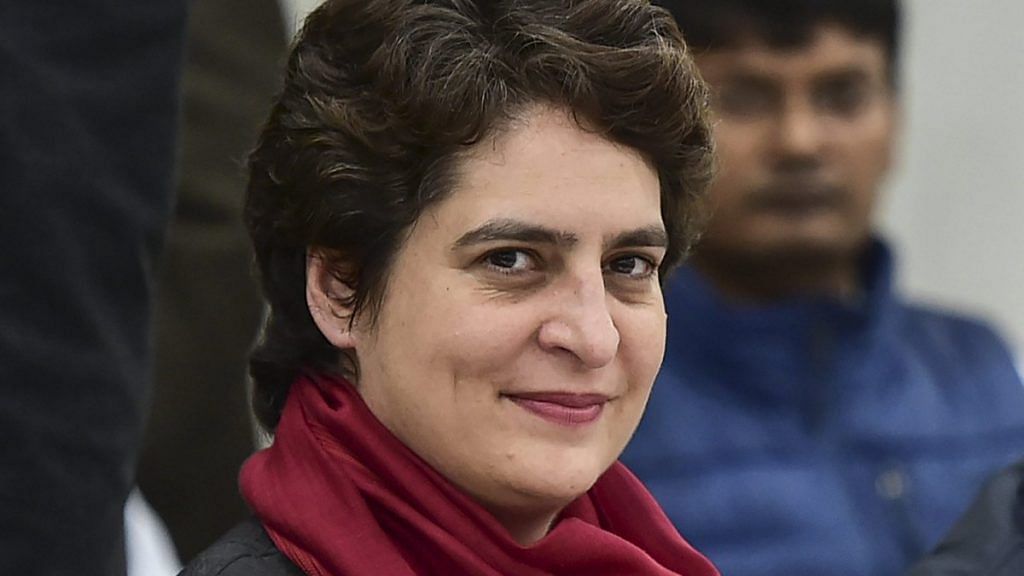The Congress is desperately trying to shoot itself in the foot. Priyanka Gandhi Vadra’s entry into politics and her Ganga yatra from Prayagraj to Varanasi is but the latest example of that. It is true that her appointment as the Congress’s general secretary in charge of eastern UP has enthused Congress party workers. She has also drawn considerable crowds and is likely to garner a sizeable number of votes for the Congress in Uttar Pradesh.
However, the question worth pondering over is: Does this serve the Congress’ principal objective, which is to prevent the BJP from returning to power after the 2019 Lok Sabha elections? The obvious answer is no. A resurgent Congress party in UP, especially if the resurgence is likely to have limited impact, could, in fact, pave the way for PM Narendra Modi’s victory. Trend analyses and electoral arithmetic indicate that UP, with its 80 Lok Sabha seats, will decide the fate of the Modi government.
Priyanka Gandhi’s entry and the Congress party’s decision to contest most of the seats in UP alone are more than likely to tilt the balance in the BJP’s favour. These twin decisions will do so by cutting into the support for the SP-BSP alliance in UP, since the alliance and the Congress have overlapping political bases in the state. Given the disastrous performance of the Yogi Adityanath government in UP and the impact of demonetisation, GST, unemployment, farmers’ distress and deteriorating law and order situation on the voters, it was reasonable to expect that in the absence of the Congress-Priyanka factor, the BJP’s share of seats would have been cut to half to about 35 or 40. The SP-BSP combine was expected to pick up the remainder. Priyanka Gandhi’s entry has put this calculation in grave jeopardy.
Also read: BJP has a poll strategy for Priyanka Gandhi — ignore her
The Congress strategy seems to be aimed not so much at defeating the BJP as denying the SP-BSP alliance victory in UP as revenge for the latter’s refusal to accommodate the Congress in the alliance. Had the Congress been sincere about preventing the BJP’s return to power and certain that Priyanka Gandhi’s charisma would make a difference to the outcome in UP, it would have put her up, in consultation with the SP-BSP combine, as the opposition’s joint candidate from Varanasi while eschewing three-cornered contests in the rest of UP. This would have made the Varanasi contest a high-profile and high-stakes fight with broader implications for the UP elections without detracting from the SP-BSP alliance’s chances of attracting votes in the rest of the state.
Furthermore, it would have tied down Prime Minister Modi to his constituency, thus reducing his capacity to campaign across the country for BJP candidates. The current scenario of three-cornered contests in UP, with the Congress unlikely to gain more than a handful of seats, is tailor-made for a BJP victory not only in the state but in the country as a whole.
But this is not the end of the story. Priyanka Gandhi’s appointment as Congress general secretary has played into the BJP’s hands by reinforcing the image that the Congress is not only a dynastic party but also that the dynasty wants to maintain its control of the party well into the future since Priyanka Gandhi has children and Rahul does not. Priyanka Gandhi’s physical similarity to Indira Gandhi is also a mixed blessing. While it does endow her with some charisma, it also reminds the older generation of the excesses committed by Indira Gandhi, like the Emergency. The subaltern castes and minorities in UP bore the brunt of these excesses. They were also largely responsible for her humiliating defeat in the 1977 Lok Sabha elections. It is, therefore, imprudent to believe that everyone is enamoured by Priyanka Gandhi’s resemblance to her grandmother. It could cut both ways.
Priyanka Gandhi also carries a great deal of negative baggage in the form of her husband Robert Vadra because of his alleged involvement in land scams. Whether proven or not, most people believe that Vadra has been involved in shady deals and thus amassed ill-gotten wealth. Now that she has entered politics, Vadra’s negative image has made Priyanka Gandhi fair game for her husband’s detractors. This has further played into the hands of the BJP’s troll army, whose primary goal is to demean the Gandhi family and the Congress party.
Also read: Priyanka Gandhi can be to Congress what Sunil Gavaskar was for India in West Indies
A footnote: Rahul Gandhi’s decision to contest from Wayanad in Kerala also defies political rationality. If he needed to stand for a second seat in the south he should have chosen a constituency in Karnataka that would have pitted him directly against a BJP candidate. Standing against the Left Front in Kerala sends the wrong message for several reasons.
One, it denotes that he is too afraid to take on the BJP even in a southern constituency. Two, it signals that he is looking for a safe seat because he is apprehensive that he will lose Amethi to BJP’s Smriti Irani. Three, although the Congress-led UDF is pitted against the Left Front in Kerala, inducting a heavyweight outsider like Rahul Gandhi into the battle is an unwarranted slap on the Left’s face. This is especially unwise since the Congress will need the Left parties as allies to form a government in New Delhi in case the BJP-led NDA falls short of a majority.
Also read: Modi created India’s north-south divide, Rahul Gandhi contesting from Wayanad will unite them
Taken together all these decisions signal that there is a serious lack of strategic thinking within the Congress leadership. This shortfall could bring the BJP back to power in New Delhi, thus subverting the Congress Party’s principal objective.
The author is the University Distinguished Professor Emeritus of International Relations, Michigan State University, and Non-Resident Senior Fellow, Center for Global Policy, Washington DC.
